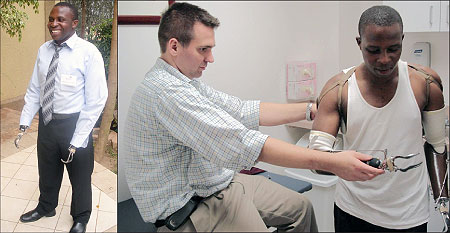IN 1996, Fredrick Ndabaramiye lost both his hands when the Interahamwe rebels (remnants of the 1994 Genocide against the Tutsi) who were hiding in the Democratic Republic of Congo attacked his village in Rubavu district (formerly Gisenyi). At the age of 15 years, Ndabaramiye was dragged out of a passenger bus and brutally attacked by Interahamwe rebels.


IN 1996, Fredrick Ndabaramiye lost both his hands when the Interahamwe rebels (remnants of the 1994 Genocide against the Tutsi) who were hiding in the Democratic Republic of Congo attacked his village in Rubavu district (formerly Gisenyi).
At the age of 15 years, Ndabaramiye was dragged out of a passenger bus and brutally attacked by Interahamwe rebels. However, when he refused to kill 18 other passengers he travelled with, the rebels hacked off his hands with machetes and left him for dead. After a year in hospital, he was placed in Imbabazi Orphanage in Rubavu district, which was a shelter started by American Roseamond Carr in the aftermath of the genocide.
Ndabaramiye said that most of his family had been slaughtered and his mother, who remained alive, did not have the resources to care for him after he lost his hands.
However, In 2002 he was taken to Columbus, Ohio where he spent six weeks with a doctor who made him a prosthetic for his hands with the support of Charlene and Bobby Jendry.
"While at the orphanage, I started to do things for myself, it was there that I decided I wanted to be an artist,” he said.
His breakthrough came when he was selected to be among the 19 children in ‘Through the eyes of children’ photography project that was founded by the late David Jiranek in 2000. Jiranek was a Broadway producer, a writer, a photographer, and a highly successful businessman. He died in an accident in August 2003 at the age of 45.
"Although I left the orphanage two years after the project was started, I was able to learn how to take pictures with a camera,” Ndabaramiye said.
In an excerpt from the ‘Through the eyes of children’ website, David Jiranek is quoted as saying: "On one hand, I want the kids to see that they have something to communicate and share with people from around the world that is meaningful. Remember, these are kids who thought nobody cared about them outside their world of the orphanage. The other side of the coin, I want people around the world to see these kids less as victims, which they of course are, but more as a possibility. When you get a hug and smile from Frederic (a boy who lost both his arms) and think about the horror he has experienced, you know that by giving yourself to his spirit, even for a moment, the world can be just a little bit better for it.”
In 2005, Ndabaramiye together with Jessica McCall and Zachary Dusingizimana, a teacher at the Imbabazi Orphanage were inspired to set up the Ubumwe Community Center (UCC) in Rubavu District.
Not willing to remain captives to hate and anger, they both turned towards forgiveness and action. Feeling lucky to be alive, they said they wanted to help those like themselves.
Ndabaramiye said that their original goal was to respectfully assist disabled children and adults.
"The UCC is making it possible for disabled children to go to school, and they are providing disabled adults with skills needed to make traditional crafts so they can be economically independent,” he said.
Tremendous progress has been registered at the centre especially for those deaf children who have never attended school. A program to help deaf children who have never been able to attend school was put in place and they are currently receiving classroom instruction in sign language.
Additionally, PIC an American Organization offers new braces and prosthetics for children and adults at the center and provides the annual operating expenses for the disabled members at the center.
"Disability is not inability,” said Ndabaramiye adding that, "as artists, I train different people with disabilities especially children. They are trained to do handcraft which can be sold at the center since we get several visitors.”
Ndabaramiye said the center is a place where the disabled are given an alternative; where they can be educated, learn new skills and ultimately work, generating a sustainable living.
"Youth programmes at the centre have also enabled young people to handle behaviour changes. This is done to avoid acts of drug abuse and its related dangers as well other social vices,” Ndabaramiye said.


